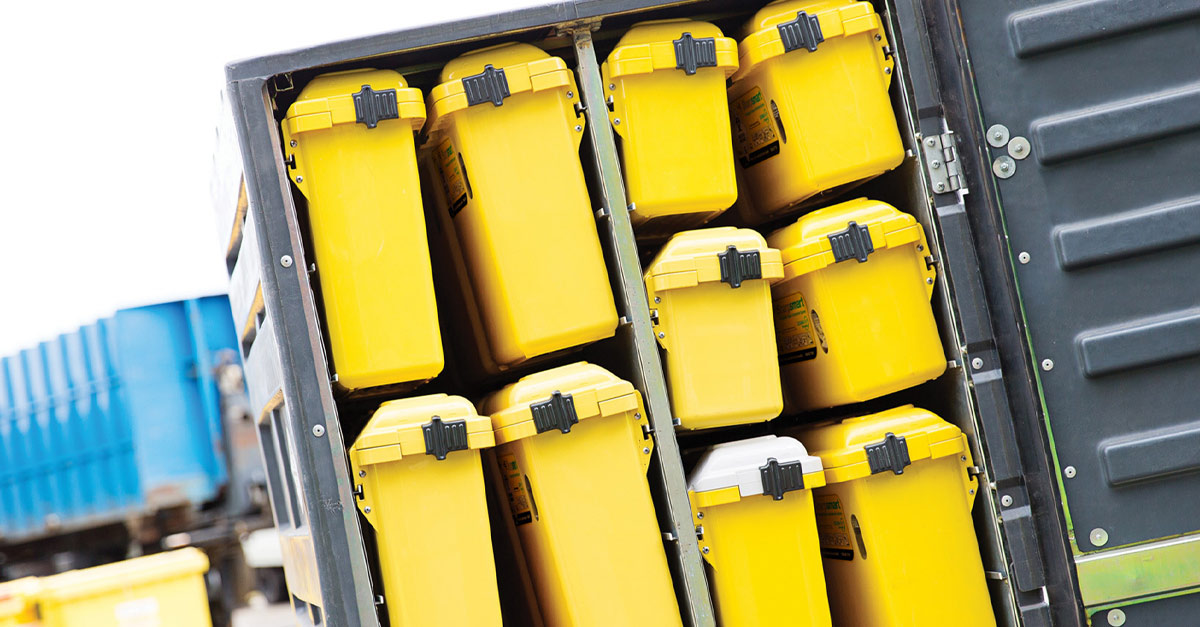Through our St Mary’s manufacturing facility and existing domestic suppliers, we were able to manufacture additional collectors and reusable sharps containers in a short amount of time.
Through our St Mary’s manufacturing facility and existing domestic suppliers, we were able to manufacture additional collectors and reusable sharps containers in a short amount of time.
According to the Australian Bureau of Statistics, nearly half of all businesses in every industry named supply chain uncertainty as a major risk to business continuity because of COVID-19. It’s something Cleanaway CEO Vik Bansal has long understood, as he guided the business to adjust to industry impacts caused by China’s National Sword policy, COAG’s planned waste expo bans, bushfire and now a pandemic.
Our recent experience onshoring the manufacture of Cleanaway Daniels’ clinical and sharps waste containers showed that moving operations closer to end users created a leaner supply chain and protected against constrained import markets which ultimately meant less wastage and more agility in meeting changes in demand.

Pictured: Locally manufactured clinical waste bins ready to be delivered to healthcare customers
Ability to scale key to maintain essential services
When borders were closed and air transport limited from the onset of the COVID-19 pandemic, the supply of many imported materials and products were impacted across Australia. At the same time, demand for healthcare services ramped up, with our customers needing to have their waste collected up to three times a day or more just to cope with the additional volumes.
The sudden increase in service requirements put a tremendous strain on our resources and had we not completed the onshoring of our container manufacturing capability in January 2020, we would have struggled to meet demand.
Through our St Mary’s manufacturing facility and existing domestic suppliers, we were able to manufacture additional collectors and reusable sharps containers in a short amount of time. With processing plants in all states, including Tasmania, we were able to assemble the assets quickly and dispatch to healthcare facilities.
It was all hands on deck with even our healthcare Account Managers helping to construct bins to ensure that our customers were able to continue providing essential healthcare services without disruption or impact to the health and safety of staff, patients and visitors.
Knock on economic, social and environmental impacts
The manufacturing capability at St Mary’s has been an incredible source of pride for the Cleanaway Daniels team, and has also enabled long-term sustainable employment in NSW.
The added costs from currency exchange rate fluctuations, taxation fees, shipping and fuel charges, were practically eliminated when we localised our supply chain. This meant less money spent on logistics, and more resources available to deliver our service more efficiently. When you reduce shipping and storage, you also reduce emissions and energy usage, which ticks boxes for the environment and our unique selling proposition.
Using completely recycled materials and buying from local suppliers are strong social and environmental propositions that most consumers can get behind. When consumers buy with confidence, the business benefits from positive brand awareness and customer loyalty.
In Albury/Wodonga, a new recycling plant will be built by Circular Plastics Australia, a joint venture by Cleanaway, Pact Group and Asahi Beverages. It’s a perfect example of a circular economy in action – Cleanaway will provide the plastic to be recycled through its collection and sorting network, Pact will provide technical and packaging expertise while Asahi Beverages and Pact will buy the recycled plastic from the facility to use in their packaging.
The closed loop system will not only reduce the reliance on foreign PET plastic supply and the corresponding risk from market fluctuations but also boost the local economy with over 300 direct and indirect jobs created.
This triple bottom line of economic, social and environmental benefits is how Cleanaway measures our value to customers and stakeholders. Keeping these in mind when making decisions about your business will help minimise your environmental impact, deliver on your commitment to customers and stakeholders, and weather the storm of uncertain economic climates.
Contact us to find out how we support businesses in every sector with our total waste management solutions.